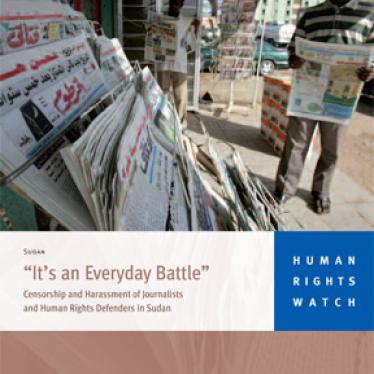(New York) - The new Sudanese government, led by the ruling National Congress Party (NCP), should immediately end its post-election repression of journalists, the media, opposition leaders, and activists, Human Rights Watch said today. The government should also urgently enact reforms promised in the 2005 Comprehensive Peace Agreement, Human Rights Watch said.
The government should either lawfully charge or promptly free several journalists and student members of the opposition United Popular Front (UPF) who have been detained without charge, some in undisclosed locations, Human Rights Watch said. Over the past two weeks, national security officials have arrested two leading opposition figures and four journalists and resumed harsh pre-print censorship.
"The National Congress Party is trying to silence political opponents, the media, and activists to stifle criticism and dissent and consolidate control," said Rona Peligal, acting Africa director at Human Rights Watch. "This repression sends a clear message that, instead of strengthening democracy, the April multi-party elections merely emboldened the party in its abuse."
In the national elections in April 2010, President Omar al-Bashir, subject of an arrest warrant from the International Criminal Court (ICC) on charges of war crimes and crimes against humanity in Darfur, was re-elected. Human Rights Watch researchers on the ground prior to and during the election found the process marred by widespread repression and human rights abuses compounded by logistical and technical failures.
On May 15, National Intelligence and Security Services (NISS) officers arrested the opposition leader Hassan al-Turabi, of the People's Congress Party (PCP), at his home in Khartoum and detained him at Kober prison, where he remains without charge. Al-Turabi is a vocal critic of the ruling party and has accused it of rigging the elections.
That evening, national security officers arrested and detained at least four journalists in a raid on the PCP-affiliated newspaper, Rai al-Shaab, and shut it down. One of the journalists, Abuzar al-Amin, told his family he was badly mistreated by national security and subjected to electrical shocks before being moved to police custody. Photographs received by Human Rights Watch show marks of torture on his body. The whereabouts of the other three journalists is unknown.
On May 19, security officials entered the offices of another opposition newspaper, Ajras Alhurria, which had been acting as host to journalists from Rai al-Shaab and running its logo in an act of solidarity. Security officials ordered editors to remove 6 of 12 pages, forcing the paper to cancel the edition. The banned articles reported the arrests of al-Turabi and the journalists, and the escalating violence in Darfur. Security officials also went to the offices of two other newspapers, Alsahafa and Alsudani, to remove articles.
National security censors have continued to censor newspapers prior to publication through site visits and phone calls to editors, which Sudanese journalists refer to as "remote control censorship."
On May 20, security officials arrested Farouk Abu Eissa, a prominent lawyer and head of a coalition of opposition parties, and questioned him for three hours about the opposition's support for al-Turabi and the ICC. A delegation of opposition parties plan to attend an ICC review conference in Kampala next month.
Separately, national security forces continue to target student members of the United Popular Front (UPF), a student group that the government alleges has links to the Darfur rebel group led by Abdel Wahid al-Nur. On May 11, security officials in Khartoum arrested three more members of this group, one of whom was released and reported to family and friends that officers took the three to an unknown location, tortured them, and interrogated them about the group's activities. The other two remain in detention in unknown locations.
Human Rights Watch research has found that dozens of the group's members have been subjected to arbitrary arrest, detention, and torture by national security officials over the past year.
The Sudanese government has repeatedly flouted promises to end pre-print censorship, last made by al-Bashir in September 2009, and other promises to enact democratic reforms as required under the 2005 Comprehensive Peace Agreement. These include reforming the repressive national security apparatus and bringing flawed criminal and media laws in line with the Interim National Constitution.
The Comprehensive Peace Agreement ended a brutal 20-year civil war and set out a six-year period for democratic transformation that included elections and a referendum on southern self-determination in January 2011. Human Rights Watch said that ongoing abuses by the NCP-dominated government do not bode well for a fair, just, and non-violent referendum process, in which southern Sudanese, including the more than 1.5 million southerners living in Khartoum and northern states, will decide whether Southern Sudan should secede from the northern states.
"The best way to ensure a peaceful referendum is to ensure respect for basic rights across the country," Peligal said. "The new government should immediately release the critics it has arbitrarily detained, and make the changes envisioned by the peace agreement and the Sudanese constitution rather than harass critics and punish peaceful dissent."
The new Sudanese government is also required to cooperate with the ICC. Al-Bashir should respond in The Hague to the charges against him, Human Rights Watch said.






